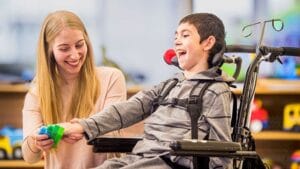Spinal Masculine Atrophy (SMA) most often affects children and makes the use of their muscles difficult.
If your child has SMA, the brain and spinal cord break up nerve cells. The brain stops transmitting signals that regulate the movement of muscles. The muscles of your child become tightened and sluggish, and children may have difficulty regulating your head‘s movement, sitting, and even walking without any assistance. In certain cases, chewing and respiration can be difficult as the condition gets worse. There are different kinds of SMA, and how serious it depends on your child’s type. No cure exists, but therapies may relieve some of the symptoms and help your child live longer in some cases. Researchers aim to discover new methods of treating the disease. Notice that every child or adult with SMA has a different experience. Regardless of how limited your child’s movement is, the disorder has little effect on their intellect. They will make and socialise with friends.

